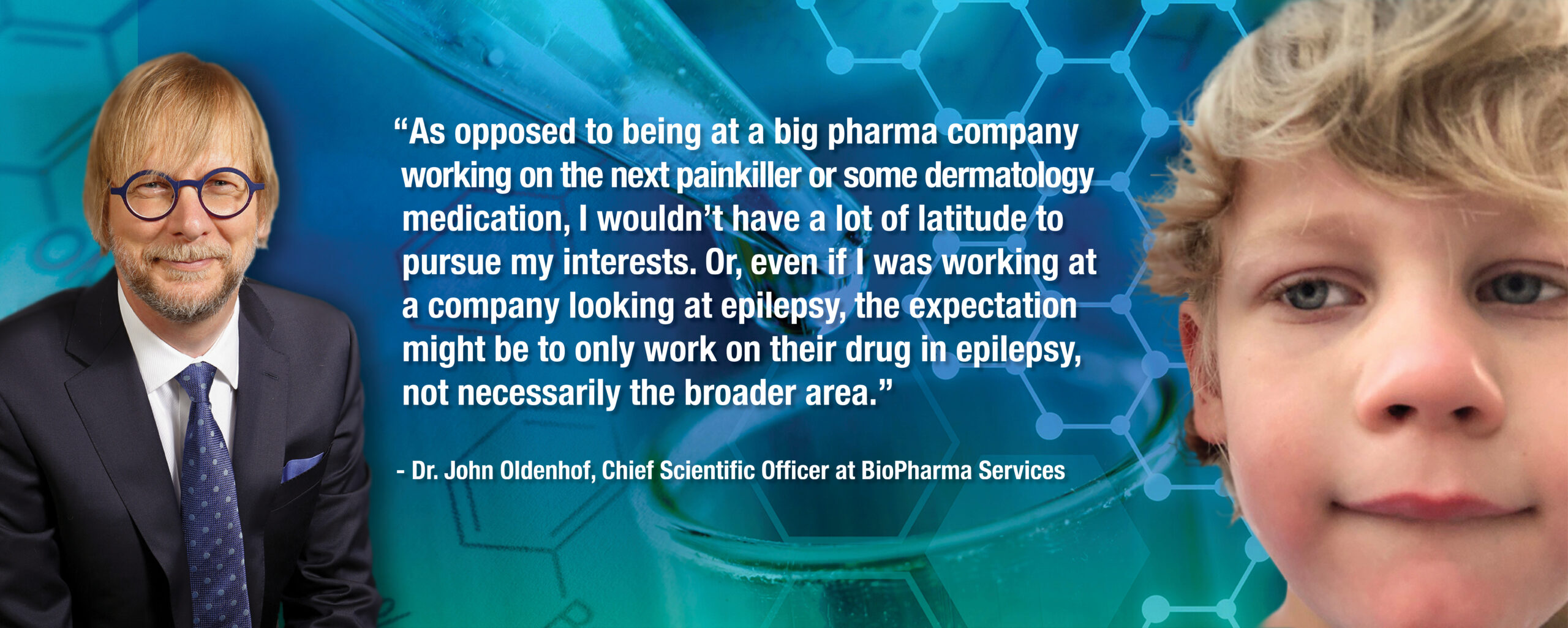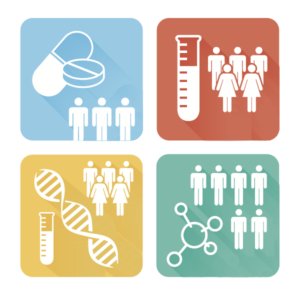Spotlight On: Dr. John Oldenhof, A Father Whose Family Fuels His Passion For Clinical Pharmacology

On a recent weekend at home in Toronto, following a couple of hopeful developments in his favored realm of the pharmacological world in which he’s been immersed for the past two decades, Dr. John Oldenhof was excited to spend some time exploring new research on treatments for epileptic encephalopathy. Instead, however, he ended up devoting the weekend to his son, Lukas, who suffers from that same type of epilepsy and needed to be cared for on the couch because his rescue medication had made him dizzy and he wasn’t able to walk on his own.
It wasn’t an unusual, remarkable or remotely resented experience for Dr. Oldenhof, of course. As all parents know, not just those who have children with rare diseases, changing plans because of your child’s needs is an unconditionally accepted part of parenting – whether that’s jumping off a Zoom meeting when you hear crying, driving a kid to soccer practice or something else.
But for Dr. Oldenhof, there is the extra pressure, and privilege, of his personal and professional passions perpetually overlapping; his family and career so closely aligned, which adds another layer of urgency — as well as a living, breathing, laughing inspiration for his work.
The week before, the STXBP1 Foundation, on which Dr. Oldenhof is a parent member of the Scientific Advisory Board, had met with a researcher who was conducting promising pre-clinical studies on this genetic epilepsy. At the same time, in his role as Chief Scientific Officer at BioPharma Services, Dr. Oldenhof had connected with a pharmaceutical company that is developing an antisense oligonucleotide therapy that could potentially be used to help in the treatments of epilepsies.
It was a bit of positive momentum, more motivation to fuel his fervent study of rare diseases and, specifically, genetic epilepsies. Still, Dr. Oldenhof’s exhilaration as a parent was tempered by his knowledge as a scientist of the lengthy, rigorous and methodical process of drug development.
“It’s always on my mind,” he says of thinking about his son, while also focusing on Phase I clinical pharmacology trial execution, one of BioPharma’s core service offerings. “These developments are all great because the technologies, as they get better, can be applied to any genetic condition. The not-so-great part is I wish they had been developed 20 years ago, and then it would be a standard now.
“As a parent, you want all these things now. You see every day that passes by, knowing that time is slipping away in terms of what you can do. But as a clinical researcher, you just know that whatever solution is still years away. So, although it’s exciting, you also know it’s going to be a while before we can apply it.”
Driven by a Purpose to Help
Countless parents of innumerable children with rare diseases “have done a fantastic job at pushing progress along,” Dr. Oldenhof says, in terms of advocacy, raising awareness and even actual studies. “So, on the one hand you feel like you should be doing that all the time, but on the other hand, you’re parenting and you need to provide your child the regular things that a child needs. It can be hard to balance.”
It’s that balance Dr. Oldenhof thinks about later, reflecting on weekends like the one when he was working to move forward STXBP1 research while also looking after Lukas, who typically has one or two seizures a day. It can be difficult to manage those two identities at once.
“The irony is, you’re wanting to race the clock (on drug development) because you have a child that has the condition, but at the same time, it’s the child with the condition that’s preventing you from racing sometimes,” Dr. Oldenhof says.
BioPharma, Dr. Oldenhof emphasizes, has been central to maintaining his version of work-life balance, encouraging and enabling both his research ambitions and parenting demands. After earning his PhD in the Department of Pharmacology & Toxicology at the University of Toronto, Dr. Oldenhof spent his first decade in the pharmaceutical industry working as a scientist and research consultant for biotech and CRO companies.
Initially drawn to pharmacology because he “saw real purpose in it,” Dr. Oldenhof quickly found an interest in new chemical entities and in human abuse liability studies that were becoming more relevant in North America in the mid-2000s, as the opioid epidemic began to emerge. “I’ve always been motivated in wanting to help,” he says. “I’ve always been very happy where I am, in terms of being able to develop drugs and knowing when the drug makes it to market that I’ve been involved in it.”
Then, about 10 years ago, his 13-month-old son started having seizures. By his second birthday, Lukas developed an epileptic encephalopathy, essentially reducing his ability to learn, and his condition declined. At the age of 3, Dr. Oldenhof and his wife, Dr. Izabella Pruska-Oldenhof, discovered their son’s progressive cerebral dysfunction was due to a genetic condition.
Dr. Oldenhof says the news, which came after a “blissful” first year with a healthy child, felt like a cruel twist of fate, given his field. “I used to cause mutations in receptors expressed in bacteria to assess how human proteins are affected by those mutations. Now, nature has put a spelling mistake in my son’s genome sequence and it’s causing all of this.”
At the time, Dr. Oldenhof was working for a small clinical pharmacology unit that was later bought by a larger contract research organization. His nine years in senior and executive director roles at what is now Syneos Health provided him a range of operational skills and insights into the industry.
In addition to mastering biostatistics, data management and regulatory processes, he learned about study design and the infrastructure needed to run Phase I trials following Good Clinical Practice, organizational expertise that appealed to BioPharma, which brought him on in 2018 to lead its clinical pharmacology team.
‘A Different Perspective’
For his part, Dr. Oldenhof was attracted to the entrepreneurial-minded company’s inclination toward Phase I clinical trials and human abuse potential, as well as more complex studies, such as those that could advance research on rare diseases like genetic epilepsies. All of that intimately intersected with Dr. Oldenhof’s interests, and he soon felt the support of the people, culture and community that welcomed his family into the BioPharma family.
Dr. Oldenhof’s work, even when it’s not directly related to Lukas, has given him a “different perspective” that he says is invaluable not only as a scientist, but also as a parent. It comes from knowing researchers often “only get a snapshot” of the people they’re studying and is a point of view that has aided him in his interactions with academics and medical doctors.
Dr. Oldenhof calls it “very satisfying” to be able to focus on areas he cares so much about, since genetic therapies and drug developments that aren’t specifically for epilepsy can still lead to improvements for his son and other children.
“BioPharma has allowed me to explore that,” he says. “As opposed to being at a big pharma company working on the next painkiller or some dermatology medication, I wouldn’t have a lot of latitude to pursue my interests. Or, even if I was working at a company looking at epilepsy, the expectation might be to only work on their drug in epilepsy, not necessarily the broader area.”
Indeed, it’s BioPharma’s genuine support, both professionally and personally, that sets it apart and, Dr. Oldenhof says, helps the company attract some of the top talent in the industry. There are times when Dr. Oldenhof must leave work, sometimes suddenly and for extended periods of time, because Lukas needs to stay at SickKids, the largest pediatric research hospital in Canada. From CEO Renzo DiCarlo and management to Dr. Oldenhof’s pharmacology team and the support staff, “everyone at the company is very understanding,” he says.
“BioPharma’s been great that way. And it’s interesting because I’ve spoken to different people at BioPharma over the years, and you find out that there are people who have children that are autistic or non-verbal, and a lot of people don’t necessarily bring that to their workplace,” Dr. Oldenhof says. “But I think when you open up yourself, you find out that there’s a lot of other people who have experienced something similar.”
That empathy, openness and sense of kinship is part of the affirmative organizational culture BioPharma has strived to foster, and it leads to clearer lines of communication and better collaboration, Dr. Oldenhof says. Whether it’s scheduling flexibility with things like doctor’s appointments and their children’s activities, or just how they relate to and learn from each other, the BioPharma culture and community benefits not just the company, but the people who work there.
A Human Impact
Pharmacology is the study of drugs and their actions on living organisms, but that scientific research is only relevant and useful in so much as it ultimately concerns the interaction of such substances with our bodies.
Thus, it is inherently about people, and requires an understanding of all types of people, backgrounds and identities. That’s why it’s so important to BioPharma to have individuals like Dr. Oldenhof, who possess both the intellect and the perspective to make sense of the human impact of drug development, from the potential for human abuse to the prospect of transformative treatment.
Dr. Oldenhof might not put it that way himself, though he does acknowledge that BioPharma’s ethos, approach and principles – those ambiguous but assured ideas of culture and community – touch all aspects of the growing business.
“I think what’s unique about BioPharma is this willingness to go into new areas and find opportunities to develop different ways of doing things,” Dr. Oldenhof says. He mentions the company’s expansion from primarily bioequivalence to other key focuses, such as Phase I trials and human abuse liability, a type of study few companies in the world are currently conducting.
“We’re still evolving in these spaces, but we do have some differentiating factors,” Dr. Oldenhof says, pointing to BioPharma’s first-class clinical trial centers – in St. Louis and Toronto, the latter offering access to a huge, diverse, healthy volunteer population – and its experienced staff as the company’s main advantages. In addition, he says, as a smaller CRO, BioPharma is nimble, fast and resourceful, able to problem solve quickly and shift gears easily to deliver excellent work every time for its clients.
As Lukas, who’s 11 years old and nonverbal, gets older, his receptive language has improved and he’s getting better at understanding what his parents are telling him. “He’s bright in ways that you have to know children like him to understand, but he knows what he wants and he’s creative in the way that he tries to get what he wants,” Dr. Oldenhof says.
His wife Izabella, an associate professor of media arts and communication and cultural studies at Ryerson University, loves plants and the house is filled with them. If nobody’s watching, Lukas will set upon and playfully “terrorize” the plants, but he’ll dutifully leave them be when his parents are in the room.
“In Dutch, we have a word, ‘boef’, which describes kind of a bandit, with a more cartoonish flavor to it,” Dr. Oldenhof says. “But we call him a boef because he’s always trying to do things that he knows he’s not allowed. He’s a character.” That boefe-ness extends to school, as well, in the most classic way.
“He knows he’s pretty good looking because he kind of always knows how to get girls and women to do things for him,” Dr. Oldenhof says. At home, Lukas never shows interest in riding a tricycle but, according to his teacher, he eagerly gets on it at school. “Turns out, what he does is summon one of the girls to come and push him.”
Dr. Oldenhof describes Lukas as easygoing and happy, even though his epilepsy often “hits him pretty hard” and results in significant discomfort. He loves electronic dance music – “it’s just amazing how that touches him” – and, even if he’s tired, Lukas will get up and start dancing when he hears it. “We’re very fortunate that he has such a good disposition,” his father says.
“I believe that Lukas has made my wife and I better people,” Dr. Oldenhof says. “Not that we were bad people before, but I look back on how I was, and there was a certain selfishness. I would never be compelled to do things for the rare disease community or the school, and now we’re involved in these things and they’re really important. We understand, even if it doesn’t help our son directly, it does help other parents and it’s worth doing.”
Since 2006, BioPharma Services has been committed to delivering excellence in early stage clinical research while delivering a best-in-class drug development experience to biotechnology and pharmaceutical companies worldwide. Contact us to learn more.



